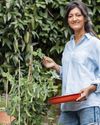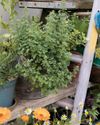Make the most of the season’s bounty with Adam Frost’s simple guide to preserving your homegrown harvest to enjoy in the months ahead.

Few things are more satisfying than growing your own fruit and veg, to pick and take straight to the kitchen. But there can come a time, usually about now, when you’ve got more produce than you know what to do with. And that’s when Mrs Frost and I start preserving, pickling and storing.
I’ve always loved cooking – I even thought about doing it for a living when I left school – so I find preserving great fun, with the bonus of having homegrown produce to enjoy during winter. It’s also a perfect way to stop anything going to waste. At home, we also love choosing a jar of pickled or preserved produce to pep up a meal – Mrs Frost even had personalised labels made!
There are lots of ways to store and preserve your produce, whether you want something sweet, savoury or even boozy! The methods aren’t difficult, and you don’t need professional kit. You’ll be amazed at the range of fruits and veggies you can continue to enjoy after they’ve finished growing in your garden.
Pickling more than peppers
Pickling produce is inexpensive and easy to do. It can be a sweet or savoury pickle, depending on the recipe, and you can use no end of different fruit and veg. These jars of delicious preserved goodies aren’t just for a ploughman’s lunch – they taste great added to soups, stews and curries, and work just as well with fish as they do with meat.
Vinegar with salt, or sugar, are the main ingredients used to pickle your fruit or veg, but you can also add other herbs and spices − such as corriander and mustard seeds, black pepper, ginger, cloves and bay leaf − to bring more flavour. Here, I’m pickling chillies, but you can pickle almost anything, including beans, cabbage, cucumber, damsons, fennel, garlic, onions and pears.
This story is from the September 2019 edition of Gardeners World.
Start your 7-day Magzter GOLD free trial to access thousands of curated premium stories, and 9,000+ magazines and newspapers.
Already a subscriber ? Sign In
This story is from the September 2019 edition of Gardeners World.
Start your 7-day Magzter GOLD free trial to access thousands of curated premium stories, and 9,000+ magazines and newspapers.
Already a subscriber? Sign In

A new plot for tasty crops
Taking on a new allotment needn't be hard work. By simply following a few easy tips you can have bumper crops in no time, just like Alessandro Vitale

We love July
July is an island floating between the joy of June and the slightly fatigued month of August. It's a grown-up month: the year has shrugged off its adolescent exuberances, the weather is (hopefully) warm enough for ice cream to be one of your five a day, the sea should be swimmable without (too much) danger of hypothermia and thoughts will be of holiday shenanigans and family barbecues. School's out this month, the next tranche of glorious summer colour is washing across our borders and it's my birthday. Lots of reasons to give three rousing cheers for July!

YOUR PRUNING MONTH
Now, at the height of summer, Frances Tophill shows how to boost your plants' health and productivity with a timely cut

Hassle-free harvests
Flowers are out in abundance this month and for Jack Wallington, many of these blooms make delicious, low-effort pickings

Bite-sized bounties
Glorious doorstep harvests can easily turn into gluts, so let Rukmini Iyer's recipes help you savour every last bit

Upcycled outdoor living
Create unique and stylish garden features for minimal cost using reclaimed materials and simple DIY skills. Helen Riches shares four step-by-step projects and more inspiring eco tips

Secrets of a COLOURFUL GARDEN
Buildings and landscapes can play a vital role in supercharging your space, as Nick Bailey demonstrates

Greening up a city balcony
Looking for sustainable, small-space gardening ideas? Take inspiration from Oliver Hymans' transformed balcony garden in north-east London - now a lush, green haven for humans and wildlife

The dry and mighty garden
As we adapt our gardens to a more volatile climate, Alan Titchmarsh reveals how to create a drought-tolerant plot and picks his top plant performers

Nature knows best
Carol Klein explains how to choose plants for specific growing conditions, based on what has naturally adapted to thrive there